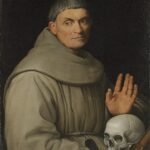Doing Battle for the Rights of God: Fr. Mateo, the Sacred Heart, and the Spanish Civil War
(Winter 2008) Some ten miles southeast of Madrid lies a hill marking the geographical center of the Iberian peninsula. Here, at the Cerro de los Angeles, occurred two remarkable events in the 20th century, which signify the battle raging in the world between Christ and Satan, between the Catholic Church and the enemies of God, between good and evil. These two events were polar opposites, indicating to us the struggle that is being daily waged for souls. On the one hand we see the merciful love of the Sacred Heart of Jesus, yearning to save souls; on the other we see the diabolical hatred towards God and His Church displayed by the devil’s henchmen. To understand the significance of this struggle, let us begin with a brief survey of the life and work of Fr. Mateo Crawley-Boevey, SS.CC. What was Fr. Mateo’s Background? Edward Crawley-Boevey was born in Arequipa, Peru,







